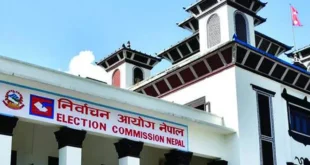 Sandeep Chachra is a social anthropologist and a human rights and justice defender. With over three decades of experience in social development, he is currently the Executive Director of ActionAid Association in India.
Sandeep Chachra is a social anthropologist and a human rights and justice defender. With over three decades of experience in social development, he is currently the Executive Director of ActionAid Association in India.
Sandeep is the Managing Editor of Agrarian South: Journal of Political Economy, a founding member of Global University for Sustainability, Agrarian South Network and part of the World Forum of Alternatives. Sandeep has also twice Co-Chaired the World Urban Campaign of UN- HABITAT. He actively writes articles and participates in media and public debates. Jubilee Post had a talk with Sandeep on the challenges of Climate change and role of Action Aid
Sandeep Ji, why has ActionAid Association taken up the cause of climate change?
For a few decades now ActionAid Association has been actively engaged in working with small farmers, agriculture workers, tribals and forest dwellers, nomadic pastoralists, fisherfolk communities, de-notified tribes and informal workers in construction, sanitation, domestic work etc. We have sought to promote their access to land and natural resources including forests, pasture land and waterbodies, link them with existing social security, housing and workers schemes and enable collective livelihood options, in several states of India.
In these efforts, we have, with many progressive environmentalists seen that the interests of environmental protection and promotion of bio-diversities cannot not be seen as separate or in isolation from the social, economic and cultural rights of these communities. Marginalized communities in India, including small farmers, landless agricultural labour, forest dwellers, pastoralists, fisher folk, who also happen to be largely tribal and Dalit populations, are disproportionately affected by environmental degradation and climate change. They often reside in ecologically fragile areas and rely heavily on natural resources for their livelihoods. While over the centuries they have lived in relative harmony with Nature, disruptions in ecosystems due to deforestation, land degradation, and pollution directly impact their access to clean water, food security, and overall well-being, exacerbating existing social inequalities. This indicates that social justice is inextricably linked to ecological justice, and ActionAid Association recognises this connection.
Over the years significant achievements have been achieved in securing forest rights, commons, and social security entitlements. While much needs to be done to further these rights, we need to also deal with impact of the climate crisis, which has been affecting vulnerable communities not only in rural areas, but also in our cities.
We recognizes that the dominant discourse on climate change was between governments and the corporate sector, and here to the developed western countries and multinational companies with interest in the continuation of the use of fossil fuels dominated. In the dominant discourse the dimension of justice related to climate action was largely missing. Even the principle of common but differentiated responsibility that was enshrined at the first Earth Summit in 1992 has been diluted. This principle recognizes that the developed countries have a greater responsibility for emitting greenhouse gases.
The Intergovernmental Panel on Climate Change (IPCC) has spoken about the vital role of community-led climate action in its reports. It emphasizes that such initiatives are essential for enhancing resilience, fostering adaptation, and reducing greenhouse gas emissions. With adequate support, these solutions can simultaneously address climate risks, ensure a just transition, and contribute to broader sustainable development.
We recognises the rights of communities over commons – this includes tribals and other forest dwellers, pastoralists, and small scale fish workers and fishing communities. This also includes the need to enable peasant farmers to pursue agro ecology or other climate-friendly agricultural practices, which many do today out of compulsion. The policy of paying for ecological services can enable many millions to act as custodians of ecological diversities and promoters of climate justice, involves a range of community-led and people-centred policies.
Also Read : Nominations open for 2024 UNEP Young Champions of the Earth award
It is with this understanding that ActionAid Association has launched a campaign for climate justice. This campaign builds on a popular understanding, analysis and protagonism on the impact of climate change and the solutions needed for climate just advances, with the leadership of those who are affected the most. This would include avoiding top down solutions and instead focusing on people-centred solutions.
We are deeply committed to addressing climate justice issues through a variety of initiatives, including popular campaigns, research endeavours, projects, workshops and studies. Our effort involves spreading awareness, mobilizing communities, conducting outreach activities and engaging with policymakers to encourage collective and meaningful change. Our work in the field of climate justice is varied and aims to set up a loss and damage framework and fund to secure vulnerable communities against climate change and make known community-led and people-centred solutions for mitigation and adaptation.
ActionAid Association’s campaign for climate justice seeks to contribute to a more equitable and sustainable future for all.
Tell about the work that ActionAid Association has done on climate change?
At the current stage of the campaign community-based action research is a major component of the campaign. , and developing collective action plans. This research conducted with various communities and sections of society, including tribal communities and indigenous communities, small farmers and rural agricultural labour and informal labour especially construction workers, street vendors and ragpickers will help build and spread community awareness about the changing nature of their vulnerabilities because of climate change. Some of the recent research work and publications include a report on “River Ecology”, “Troubles in the Sundarbans”, “Lost to Sea” and “Climate Justice for Gujjar Pastoral Communities”.
The “River Ecology – An assessment of the impact of COVID-19 lockdown” examines the effects of the COVID-19 lockdown on river ecosystems in India. The report focuses on the environmental changes observed in rivers during the lockdown period and assesses the impact of reduced human activities on river ecology. The lockdown had mixed effects on river-dependent communities, including fisherfolk, farmers, and indigenous communities. While reduced pollution levels benefited some communities by improving water quality and fish stocks, others faced challenges due to restrictions on fishing and agricultural activities. The report emphasizes the need for sustainable management practices to maintain the positive environmental changes observed during the lockdown period. It calls for continued efforts to reduce pollution, protect river ecosystems, and promote community-based conservation initiatives.
The “Trouble in the Sundarbans” report by AAA focuses on the environmental and socio-economic challenges facing the Sundarbans, a UNESCO World Heritage site and one of the largest mangrove forests in the world. The report highlights the impacts of climate change, industrialization, and government policies on the fragile ecosystem and the livelihoods of the local communities.
“Lost to Sea” report, examines the devastating effects of climate change-induced sea-level rise on coastal communities in India, with a particular focus on the states of Odisha and West Bengal. The report highlights the disproportionate effects of rising sea levels on marginalized communities, including fisherfolk, farmers, and indigenous groups, who rely on coastal resources for their livelihoods. Rising sea levels have led to the displacement of thousands of families from their homes and traditional fishing grounds. The report calls for urgent action to address the root causes of vulnerability to sea-level rise, including measures to protect coastal ecosystems, strengthen disaster preparedness and response mechanisms, and ensure the rights and livelihoods of affected communities are safeguarded. It emphasises the need for gender-responsive policies and programs that prioritise the needs and voices of women in coastal adaptation and resilience-building efforts.
“Climate Justice for Gujjar Pastoral Communities” study, which sheds light on the challenges faced by the Gujjar, a nomadic pastoralist community predominately located in the states of Jammu and Kashmir and Himachal Pradesh, in adapting to changing climatic conditions. Through in-depth interviews and participatory research methods, the study identifies key barriers to climate resilience among Gujjar communities and proposes community-driven solutions to enhance their adaptive capacity.
Another report under preparation is on how climate change is impacting sugar cane workers in Maharashtra.
To give a greater impulse to these efforts in cities of India, a series of workshops are being organised. Two have been held in Bhubaneshwar, Odisha and Lucknow, Uttar Pradesh and others are happening in Shimla, Himachal Pradesh, Chennai, Tamil Nadu and Guwahati, Assam in the next weeks, where representative from state government bodies, grass roots based civil society organisations and people’s formations are discussing aspects to consider in greater detail. In the coming months, initiatives to develop participatory research based community climate action plans would be undertaken in around 20 different cities of India, that would help build grounded momentum for the climate justice momentum in urban India.
Do you also work in Urban Areas for Climate Justice ?
Yes, off course. The 21st Century is often referred to as an urban century – cities will rise across the globe and define future trajectories of human civilization. With millions of people arriving in urban areas in the developing world every month and an estimated 70% of global GDP arising from urban areas, the proposition of an urban century does not seem farfetched. Another defining feature of the 21st Century is climate change’s impact on human civilizations across the globe. Cities in developing countries would be disproportionately affected by the scarcity of water, eccentricity of precipitation and increasing temperatures. The poor and vulnerable would again bear a proportionately higher brunt of these changes, and their vulnerabilities would be enhanced. As India prepares for climate change-induced distress, we must focus on making sustainable and inclusive cities resilient against natural calamities resulting from climate change. The past few years have seen an increased number of climate disasters like excessive rainfall leading to massive floods, prolonged spells of drought, rising temperatures and increased frequency of cyclonic formations. Thus, there is an emerging necessity of looking into the policy planning focusing on climate resilience with issues of the poor and marginalized at the centre to achieve true ecological justice.
Also Read : Rich countries use six times more resources, generate 10 times more climate impacts
It is with this understanding that ActionAid Association is actively engaged in addressing climate change issues in urban areas through various initiatives aimed at building resilience, promoting sustainable development, and advocating for climate justice. We works with urban local bodies and communities to develop and implement climate-resilient urban planning strategies. This includes initiatives such as promoting green infrastructure, sustainable transportation, and disaster risk reduction measures to enhance the resilience of urban areas to climate change impacts. We implement community-based adaptation projects in urban areas to empower vulnerable communities, including slum dwellers and informal settlements, to cope with the impacts of climate change. This may involve initiatives such as livelihood diversification, water management, and urban agriculture to enhance resilience and reduce vulnerability.
ActionAid Association also conducts climate education and awareness programs in urban areas to raise awareness about climate change issues and build capacity among urban residents to take action. This includes workshops, training programs, and awareness campaigns on topics such as climate change mitigation, energy efficiency, and waste management. Additionally, we conduct research and advocacy efforts to promote policies and measures that address climate change in urban areas. This includes research studies on urban climate vulnerability, policy briefs, and advocacy campaigns aimed at influencing decision-makers to prioritize climate action in urban planning and development. ActionAid Association actively participates in climate justice campaigns at the local, national, and international levels to advocate for the rights of urban residents, particularly marginalised communities, in the face of climate change. This may involve mobilizing communities, organizing rallies, and lobbying governments and policymakers to take urgent action on climate change.
In November 2022 ActionAid Association had organised “Urban Action School (UAS) 2022: Towards Climate-Just Cities” as a week-long course covering various aspects of urban climate justice action with a focus on the cities of the Global South. This was designed essentially for mid and senior-level activists, policy advocates, lawyers, journalists, researchers, and all categories of urban policy practitioners.
Share some information on your work on climate justice on the global stage?
ActionAid Association is at the forefront of global advocacy for climate justice, working tirelessly to address the impacts of climate change on vulnerable communities worldwide. Through various initiatives such as the Urban Action School, participation in international forums like the World Social Forum 2024 in Nepal as part of Global Social Movement and Building People Power, and advocacy efforts such as the call for a Loss and Damage Fund at COP28, we are actively engaged in promoting climate justice on the global stage.
The Urban Action School is a flagship initiative of AAA aimed at empowering urban communities to address climate change and its impacts on their livelihoods and well-being. The school takes place every year in Thrissur, Kerala and provides training, capacity-building workshops, and resources to practitioners to become leaders and advocates for climate justice in their cities. Through the Urban Action School, AAA equips participants with knowledge and skills on climate resilience, sustainable urban development, and community-based adaptation strategies. Participants learn about the interconnectedness of social, economic, and environmental factors shaping urban climate vulnerability and are empowered to take action to build more resilient and sustainable urban communities.
Our participation in the World Social Forum 2024 in Nepal indicates its commitment to global solidarity and collective action for climate justice. The forum serves as a platform for civil society organisations, grassroots movements, and activists from around the world to come together to discuss pressing social, economic and environmental issues, including climate change. At the World Social Forum 2024 in Nepal, ActionAid Association amplified the voices of marginalised communities disproportionately affected by climate change, highlighting their experiences, struggles and concerns for climate justice. Through workshops, panel discussions and advocacy activities, we foster dialogue, builds alliances, and mobilizes support for transformative solutions to the climate crisis that prioritize the rights and needs of the most vulnerable populations by building social movements and people power.
Furthermore, AAA is a leading advocate for addressing loss and damage associated with climate change, particularly for communities in the Global South who bear the brunt of its impacts despite having contributed the least to global greenhouse gas emissions. At COP28, ActionAid Association called for the establishment of a Loss and Damage Fund to provide financial assistance and support to communities affected by climate-related disasters and irreversible impacts. The Loss and Damage Fund proposed by ActionAid Association aims to ensure that affected communities receive adequate compensation, assistance, and resources to recover and rebuild their lives and livelihoods in the aftermath of climate-related disasters. By advocating for the establishment of such a fund, AAA seeks to hold wealthy countries accountable for their historical responsibility for climate change and support the rights and resilience of vulnerable communities facing its worst consequences.
Also Read : Conclave on Climate Change, Impacts and Challenges
Our work on climate justice on the global stage encompasses a range of initiatives aimed at empowering communities, fostering dialogue, building alliances, and advocating for transformative change. We strive to continue to be a driving force for climate justice both at the national and international levels.
What are key values in your organization’s approach in addressing climate change?
At the core of AAA’s approach and strategy to addressing climate change are key values that guide our efforts in raising awareness, engaging communities, fostering community custodianship, and advocating for people-centred solutions to climate change and justice.
One of the foundational values in our approach to climate change is awareness building. The organization recognizes the importance of educating communities about the causes, impacts, and consequences of climate change. Through various educational initiatives, workshops, and campaigns, we raise awareness about the interconnectedness of environmental degradation, social injustice, and economic inequality. By empowering communities with knowledge, we enable them to understand the urgency of climate action and the need for collective solutions. Awareness building also involves highlighting the disproportionate impact of climate change on marginalised communities, particularly women, indigenous peoples, and smallholder farmers. AAA emphasizes the link between climate change and existing vulnerabilities, such as food insecurity, displacement, and loss of livelihoods. By shedding light on these issues, we mobilise support for inclusive and equitable climate policies that prioritize the needs of the most affected populations.
Another key value in our approach is the active involvement of people in the conversation about climate change. AAA believes in participatory decision-making processes that empower communities to contribute their knowledge, perspectives, and solutions to climate-related challenges. Through participatory methods such as community meetings, consultations, and citizen science projects, we foster dialogue and collaboration among diverse stakeholders. By engaging people directly in the conversation, AAA ensures that climate policies and interventions are informed by local realities and contextualized to meet the unique needs of each community.
Community custodianship is a central value in ActionAid Association’s approach to climate change, underlining the importance of local stewardship and collective action. We work to empower communities as custodians of their natural resources, encouraging sustainable land management practices, forest conservation, and biodiversity protection. Through initiatives such as community-based natural resource management and agroecology, AAA promotes a holistic approach to climate resilience that integrates traditional knowledge with modern techniques. By investing in the leadership and agency of local communities, ActionAid Association creates lasting impacts that extend beyond individual projects to transform entire landscapes and livelihood systems.
At the heart of AAA’s approach to climate change is the belief in community-led, people-centred solutions that prioritize the needs and rights of local communities.
 Jubilee Post News & Views
Jubilee Post News & Views





